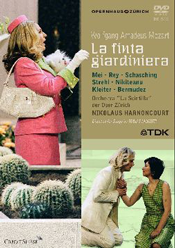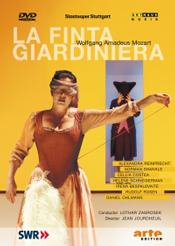
20 Jul 2008
Mozart’s La Finta Giardiniera x2
With a composer as widely beloved as Wolfgang Amadeus Mozart, for an opera to be all but forgotten suggests the work has problems beyond redemption.
The Sixteen continues its exploration of Henry Purcell’s Welcome Songs for Charles II. As with Robert King’s pioneering Purcell series begun over thirty years ago for Hyperion, Harry Christophers is recording two Welcome Songs per disc.
In February this year, Albanian soprano Ermonela Jaho made a highly lauded debut recital at Wigmore Hall - a concert which both celebrated Opera Rara’s 50th anniversary and honoured the career of the Italian soprano Rosina Storchio (1872-1945), the star of verismo who created the title roles in Leoncavallo’s La bohème and Zazà, Mascagni’s Lodoletta and Puccini’s Madama Butterfly.
Collapsology. Or, perhaps we should use the French word ‘Collapsologie’ because this is a transdisciplinary idea pretty much advocated by a series of French theorists - and apparently, mostly French theorists. It in essence focuses on the imminent collapse of modern society and all its layers - a series of escalating crises on a global scale: environmental, economic, geopolitical, governmental; the list is extensive.
Amongst an avalanche of new Mahler recordings appearing at the moment (Das Lied von der Erde seems to be the most favoured, with three) this 1991 Mahler Second from the 2nd Kassel MahlerFest is one of the more interesting releases.
If there is one myth, it seems believed by some people today, that probably needs shattering it is that post-war recordings or performances of Wagner operas were always of exceptional quality. This 1949 Hamburg Tristan und Isolde is one of those recordings - though quite who is to blame for its many problems takes quite some unearthing.
The voices of six women composers are celebrated by baritone Jeremy Huw Williams and soprano Yunah Lee on this characteristically ambitious and valuable release by Lontano Records Ltd (Lorelt).
As Paul Spicer, conductor of the Royal Birmingham Conservatoire Chamber Choir, observes, the worship of the Blessed Virgin Mary is as ‘old as Christianity itself’, and programmes devoted to settings of texts which venerate the Virgin Mary are commonplace.
Ethel Smyth’s last large-scale work, written in 1930 by the then 72-year-old composer who was increasingly afflicted and depressed by her worsening deafness, was The Prison – a ‘symphony’ for soprano and bass-baritone soloists, chorus and orchestra.
‘Hamilton Harty is Irish to the core, but he is not a musical nationalist.’
‘After silence, that which comes closest to expressing the inexpressible is music.’ Aldous Huxley’s words have inspired VOCES8’s new disc, After Silence, a ‘double album in four chapters’ which marks the ensemble’s 15th anniversary.
A song-cycle is a narrative, a journey, not necessarily literal or linear, but one which carries performer and listener through time and across an emotional terrain. Through complement and contrast, poetry and music crystallise diverse sentiments and somehow cohere variability into an aesthetic unity.
One of the nicest things about being lucky enough to enjoy opera, music and theatre, week in week out, in London’s fringe theatres, music conservatoires, and international concert halls and opera houses, is the opportunity to encounter striking performances by young talented musicians and then watch with pleasure as they fulfil those sparks of promise.
“It’s forbidden, and where’s the art in that?”
Dublin-born John F. Larchet (1884-1967) might well be described as the father of post-Independence Irish music, given the immense influenced that he had upon Irish musical life during the first half of the 20th century - as a composer, musician, administrator and teacher.
The English Civil War is raging. The daughter of a Puritan aristocrat has fallen in love with the son of a Royalist supporter of the House of Stuart. Will love triumph over political expediency and religious dogma?
Beethoven Symphony no 9 (the Choral Symphony) in D minor, Op. 125, and the Choral Fantasy in C minor, Op. 80 with soloist Kristian Bezuidenhout, Pablo Heras-Casado conducting the Freiburger Barockorchester, new from Harmonia Mundi.
A Louise Brooks look-a-like, in bobbed black wig and floor-sweeping leather trench-coat, cheeks purple-rouged and eyes shadowed in black, Barbara Hannigan issues taut gestures which elicit fire-cracker punch from the Mahler Chamber Orchestra.
‘Signor Piatti in a fantasia on themes from Beatrice di Tenda had also his triumph. Difficulties, declared to be insuperable, were vanquished by him with consummate skill and precision. He certainly is amazing, his tone magnificent, and his style excellent. His resources appear to be inexhaustible; and altogether for variety, it is the greatest specimen of violoncello playing that has been heard in this country.’
Baritone Roderick Williams seems to have been a pretty constant ‘companion’, on my laptop screen and through my stereo speakers, during the past few ‘lock-down’ months.
Melodramas can be a difficult genre for composers. Before Richard Strauss’s Enoch Arden the concept of the melodrama was its compact size – Weber’s Wolf’s Glen scene in Der Freischütz, Georg Benda’s Ariadne auf Naxos and Medea or even Leonore’s grave scene in Beethoven’s Fidelio.

With a composer as widely beloved as Wolfgang Amadeus Mozart, for an opera to be all but forgotten suggests the work has problems beyond redemption.
In the most recent “Mozart year” (they seem to come around often), companies stretched out to find lesser known corners of Mozart’s repertoire, and La Finta Giardiniera found itself staged around the world, almost as if it had just been rediscovered in some dusty drawer. Both DVDs discussed here come with 2006 copyrights. Though neither cast features “star” performers, the Zurich staging might seem to have more prestige. Conductor Nikolaus Harnoncourt leads the Orchestra “La Scintilla” of the Zurich opera house, with soprano Eva Mei and upcoming tenor Christopher Strehl in the leads. In the Stuttgart version, Alexandra Reinprecht and Norman Shankle take on those roles. Both productions can fairly be called modern stagings, with the spare, pastel aesthetic your reviewer calls “Crate and Barrel.” However, the Stuttgart designers, perhaps surprisingly for a house with a reputation for boldness, stick to fairly traditional costuming. In Zurich, the singers cavort in contemporary threads.
What matters, however, is that both of these DVDs give fair evidence that La Finta Giardiniera has been unwisely neglected. Mozart’s melodic flair had not matured when he composed the score, but putting aside the lack of instantly memorable tunes, the music is always dramatically apt and frequently inventive. The opening of act three, in particular, has the sort of sweet, sad atmosphere of one of the great piano concerto adagios. And what once might have been considered the libretto’s weakness of a diffuse, confused scramble of mismatches and pained redemption, actually plays quite well in the 21st century — certainly better than the faux-religiosity of The Magic Flute.
 The Stuttgart production gives the back story in a pantomime under the overture. Count Belfiore had caught his beloved, Violante, in a compromising situation and assaulted her, with a knife yet. She recovered and fled, and he has gone in search of her. She calls herself Sandrina now, while working as a gardener for the mayor of a small town. A niece, a female servant, and a visiting knight are thrown into the mix, with the comings and goings at some points resembling the first act action of Don Giovanni — and La Finta Giardiniera is also called a “dramma giocoso.”
The Stuttgart production gives the back story in a pantomime under the overture. Count Belfiore had caught his beloved, Violante, in a compromising situation and assaulted her, with a knife yet. She recovered and fled, and he has gone in search of her. She calls herself Sandrina now, while working as a gardener for the mayor of a small town. A niece, a female servant, and a visiting knight are thrown into the mix, with the comings and goings at some points resembling the first act action of Don Giovanni — and La Finta Giardiniera is also called a “dramma giocoso.”
As directed by Tobias Moretti, the Zurich staging has much more “giocoso” than that in Stuttgart. In fact, the comedy gets played up a bit broadly, although Eva Mei’s stricken Sandrina manages to be affecting throughout. The clean white set features two beds of various cacti, a not too confusing symbol for the pain that has sprouted in these lovers’ hearts. Moretti goes in too often for silly pantomime skits between numbers, which partly explains why this is a two disc set, as opposed to the single disc for the Stuttgart version (Stuttgart also appears to have cut some numbers). Although the comedy gets a bit broad, this Zurich production overall features more impressive singing and the dynamic leadership in the pit of Harnoncourt. Unfortunately, the booklet note tends to the obtuse, and without a plot summary, some viewers may find the action confusing.
The Arthaus Musik DVD for Stuttgart delivers an exemplary booklet, with a fine essay on the opera, a summary, and artist biographies. Furthermore, as directed by Jean Jourdheuil, the action comes across with great clarity, although the set never really establishes any particular locale (neither does that in Zurich). Jourdheuil references the comedy when appropriate, but the emphasis is on the mental distress and confusion of the wayward lovers. When they all congregate in a darkened garden, they wear lighted goggles, and still fumble around in the dark, unable to really locate each other.
If only the cast were more interesting to listen to. A former member of San Francisco Opera’s Merola program, Shankle has a very pleasant tenor, though he hardly seems like the violently jealous type. Alexandra Reinprecht, decent enough, only makes Eva Mei look all the more impressive. The other voices make no special impression, excepting the annoying gruffness of Daniel Ohlmann’s mayor.
So true Mozart lovers who have yet to get to know La Finta Giardiniera should probably find room in their budget for both these DVDs. If that can’t be done, it’s a choice between better singing (Zurich) and a more comprehensible staging (Stuttgart). And opera companies looking to broaden their repertory (are there any such in the USA?) should give this early Mozart work another look.
Chris Mullins